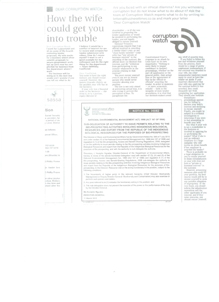|
Getting your Trinity Audio player ready...
|
 Dear Corruption Watch
Dear Corruption Watch
I work for a parastatal and sit on some of the boards reviewing tender proposals.
My wife works for a business which often submits proposals to secure government work, but up until now has not pitched for business from the department where I work.
Her business will be doing so in the next few weeks and I wonder if you can tell me what to do. I believe it would be a conflict of interest for me to review and compare her tender submission with others. How do I recuse myself? I want to set a good example for my colleagues and do the right thing for the department.
Yours faithfully
Conflicted
Dear Conflicted,
You seem to have the right instinct: you should recuse yourself. However, the answer depends slightly on the position your wife has in the business.
If your wife has a financial stake in the business – she owns it, or is a partner, equity director or shareholder – or if she was involved in preparing the tender application or would be involved in performing the tender, you are legally obliged to recuse yourself.
National Treasury regulations require that if an official involved in awarding a tender (that's you), or any "close family member" (your wife) has "any private or business interest" in the awarding of the contract, the official must: (a) disclose that interest; and (b) "withdraw from participating in any manner whatsoever in the process relating to that contract".
You must recuse yourself even if you are an honest person who would never consider abusing your position.
The law is not only aimed at preventing actual bias, it is also trying to prevent the perception of bias. To paraphrase the Constitutional Court's response to an attack by Louis Luyt on its own impartiality: "Nothing is more likely to impair confidence in [tender] proceedings, whether on the part of [applicants] or the general public, than actual bias or the appearance of bias in the official or officials" awarding the tender. In order to maintain – or more accurately, rebuild – faith in the integrity of state tender procedures, it is vital that our decision-makers avoid any whiff of possible bias.
If you failed to follow the law and withdraw yourself from the process, there would be a range of pretty unpleasant consequences. If the contract was awarded to your wife, the other unsuccessful tenderers could apply to court to have the tender set aside. If your superiors discovered that your wife was applying for the contract before it was awarded, they could disqualify her from completing her application. They should also institute disciplinary proceedings against you for failing to declare your wife's interest and declining to recuse yourself. Finally, you might be subject to a criminal investigation to determine if you were in fact attempting to benefit your wife.
But what if your wife is not a stakeholder in the business or involved in applying for or performing the tender? What if she is just an ordinary employee in a large company who will derive no direct benefit if her employer is awarded the tender?
There is probably not a legal obligation on you to recuse yourself in those circumstances as your wife does not have a "private or business interest" in the outcome.
However, presuming someone else could fill your position, the best course would still be to recuse yourself to avoid any possible allegation of impropriety. At the very least, you should inform the adjudication committee and the other applicants of your interest, and if they raise concerns, you should recuse yourself.
Excerpt
I work for a parastatal and sit on some of the boards reviewing tender proposals. My wife works for a business which often submits proposals to secure government work, but up until now has not pitched for business from the department where I work.
File Upload



